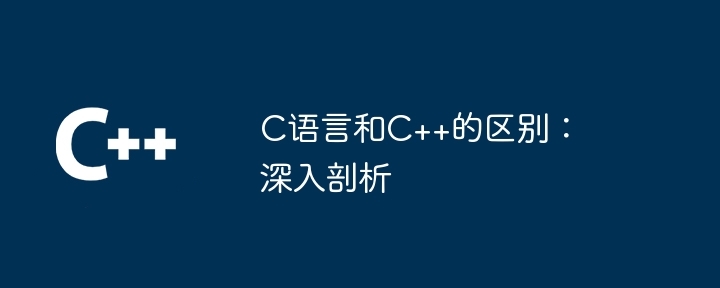Home >Backend Development >C++ >The difference between C language and C++: an in-depth analysis
The difference between C language and C++: an in-depth analysis
- PHPzOriginal
- 2024-04-04 09:57:011194browse
The main differences between C and C are syntax, features and uses. Syntax: C uses curly braces { } to define code blocks, and C uses a more flexible object-oriented syntax. Features: C introduced polymorphism, encapsulation, and inheritance, features that C did not support. Practical examples: C focuses on computation, while C focuses on creating object-oriented programs, such as managing student information.

The difference between C language and C: in-depth analysis
C and C are both widely used programming languages, but they have different syntax , features and uses. This article will take an in-depth look at the differences between C and C, including syntax, features, and practical examples.
Syntax
- C uses a structured syntax, using curly braces {} to define blocks of code, while C uses a more flexible object-oriented syntax.
- C uses header files (.h) to declare functions and variables, while C uses header files (.h) to declare header files and source files (.cpp) to define functions and variables.
- C uses pointers and arrays to manage memory, and C introduces the new concepts of references and pointers.
Features
- Polymorphism: The C language does not support polymorphism, which means that the behavior of a function Cannot change based on the object on which it is called. C introduced polymorphism, allowing the behavior of a function to change depending on the object it is called on.
- Encapsulation: The C language does not have an encapsulation mechanism, which means that data and operations are directly exposed. C introduced encapsulation, which allowed data to be hidden within classes and only the necessary methods to be exposed.
- Inheritance: The C language does not support inheritance, which means that new classes cannot be created from existing classes. C supports inheritance, allowing derived classes to be created from a base class and inherit its properties.
Practical case
C Language: Calculate the sum of two numbers
#include <stdio.h>
int main() {
int num1, num2;
printf("请输入两个数字:");
scanf("%d %d", &num1, &num2);
int sum = num1 + num2;
printf("和为:%d\n", sum);
return 0;
}C: Using classes to represent students
#include <iostream>
using namespace std;
class Student {
public:
string name;
int age;
float gpa;
};
int main() {
Student student;
cout << "请输入学生姓名:";
cin >> student.name;
cout << "请输入学生年龄:";
cin >> student.age;
cout << "请输入学生 GPA:";
cin >> student.gpa;
cout << "学生信息:" << endl;
cout << "姓名:" << student.name << endl;
cout << "年龄:" << student.age << endl;
cout << "GPA:" << student.gpa << endl;
return 0;
}Conclusion
C and C have significant differences in syntax, features, and uses. C is a procedural language, while C is an object-oriented language. C inherits the advantages of C while adding new features such as polymorphism, encapsulation, and inheritance. Which language you choose depends largely on the specific requirements of your project.
The above is the detailed content of The difference between C language and C++: an in-depth analysis. For more information, please follow other related articles on the PHP Chinese website!

